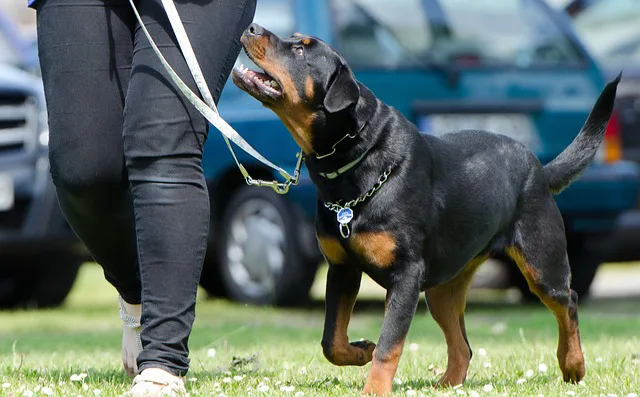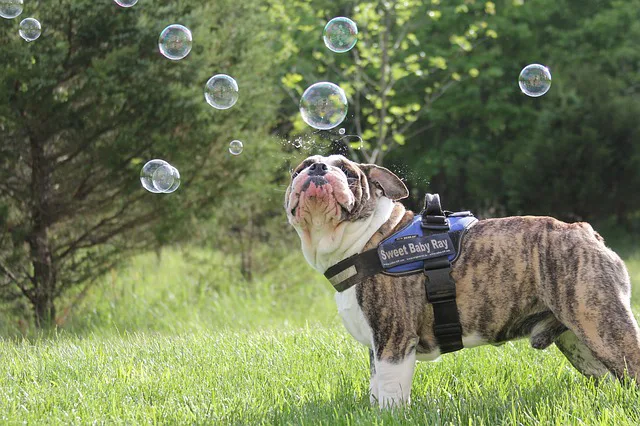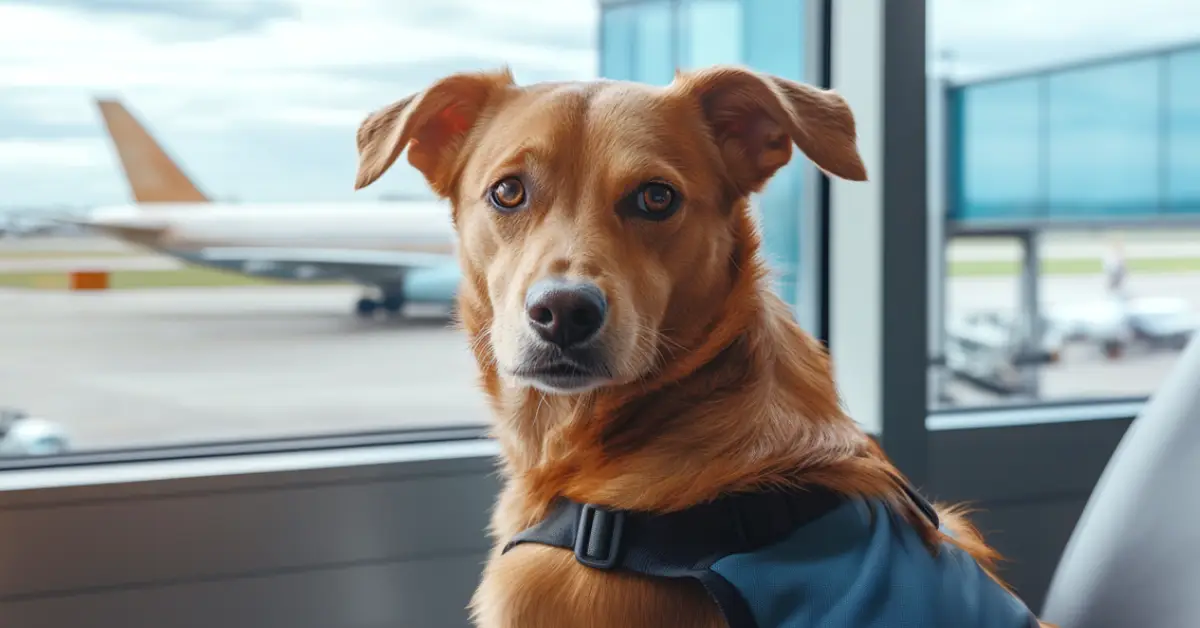Home Page › Blog › How to Certify a Service Dog
How to Certify a Service Dog

If you want to be certified for a service dog, just follow these 5 steps:
- Identify whether you have an ADA-eligible disability (which can be physical or psychiatric).
- Get a health confirmation letter from your doctor or therapist. This step is optional, but a PSD letter can be helpful backup documentation.
- Train your dog to perform a task that helps with your condition.
- Make sure your dog is comfortable in public spaces; they should be able to pass a public access test.
- Certify your dog’s service dog status by getting a certificate stating you’ve met all service dog requirements — but remember, this step is not required.
You can’t qualify for a service dog just by getting a certification. Certifications are used by service dog owners for personal convenience, but they are not required under ADA rules. If someone refuses to let your service dog in because you don’t have a certificate, they are in the wrong. To verify a service dog, they can ask you just two questions: 1. Is the dog a service dog required for a disability? and 2. What work or task has the dog been trained to perform?
ADA Service Dog Certification Requirements
Here’s something that might surprise you: service dogs don’t need any official paperwork to do their important work! The ADA keeps things simple — no special licenses or registrations are required. This is what is stated on the official ADA website:
“Covered entities may not require documentation, such as proof that the animal has been certified, trained, or licensed as a service animal, as a condition for entry.”
What really matters is that your service dog is well-trained and can perform specific tasks to help with your disability. But here’s something to consider — while certification isn’t required, getting your service dog certified voluntarily can make life easier.
Think of it like having a VIP pass at a concert. Sure, you can still get in without it, but having one might make the whole experience smoother. With a certificate stating you’ve qualified as a service dog owner, you’ll sometimes face fewer questions when entering stores or restaurants, and some property managers might be more welcoming when you’re looking for housing. Just remember: whether you choose to get a certificate or not, the law is still on your side, and businesses must respect your right to have your service dog with you.
Service Dog Certifiers
In the U.S., there is no government certification program for service dogs. No organization or company has been sanctioned under ADA rules as an official service dog certifier.
Certification of a service dog is done voluntarily by service dog owners through private organizations like us here at Service Dog Certifications. You can get accessories like vests, tags, ID cards, and certificates from organizations like ours to make your life as a service dog handler in public areas easier.

How to Train a Certified Service Dog
If you want your dog to be a certified service dog, you do it through training the dog to help with your disability. A certificate can demonstrate that you completed the training, but you can’t just buy a certificate and call it a day. When training a dog to become a certified service animal, you have three main options: self-training, group classes, or individual training. Each method has its benefits and drawbacks, especially for service animals.
Self-Training
Self-training is the cheapest option and means teaching your service dog on your own. One benefit is that you and your dog can form a greater bond during the experience and also have the flexibility to train when the time suits you. Plus, you’ll gain skills to train your dog in new tasks as your needs change.
For example, if you train your dog to retrieve items, you’ll learn to break down complex tasks into smaller steps. This knowledge can help when you need to teach new services later, like opening doors or providing balance support.
Group Classes
Looking to save money on service dog training? Group classes offer an affordable sweet spot between expensive private lessons and budget-friendly self-training.
One of the biggest perks of group training is the real-world practice your dog gets. Your future service dog will learn to stay focused on you even when other dogs are nearby – a must-have skill for public access work. It can help your dog calmly ignore other animals at the grocery store or stay perfectly still under a restaurant table.
During these classes, you’ll work on essential service dog commands like “leave it,” “stay,” and “under” alongside other handlers. Plus, there’s a hidden benefit: you’ll connect with people who truly understand your journey. Many handlers find lasting friendships and valuable support networks through group classes.
But before you sign up, consider your schedule. Most group classes meet at set times, usually once or twice a week. While this regular schedule helps build a routine, it might clash with work or medical appointments. Some training centers offer evening or weekend options to help with scheduling challenges.
Individual Training
Private service dog training sessions are more expensive than the previous options, making them the premium choice for handler-dog teams. But here’s what that investment really buys you: undivided attention from a certified professional trainer who focuses solely on your unique needs and goals.
Think of it like having a personal coach for you and your dog. Your trainer creates a custom training plan that targets specific tasks tied to your disability. For example, if you have mobility challenges, they’ll teach your dog to:
- Brace for stability during transfers
- Retrieve dropped items with gentle mouth control
- Push accessibility buttons
- Help with removing clothing items
- Navigate tight spaces safely
One of the biggest advantages? Your trainer’s expert eye. They can spot your dog’s natural talents and transform them into reliable service tasks. Maybe your dog naturally paws at you when anxious – a skilled trainer could shape this into a panic attack response. These personalized insights are incredibly valuable for developing effective assistance dogs.
Flexibility is another key benefit. Private trainers often work around your schedule, energy levels, and medical appointments. This means you can train when you’re at your best rather than push through a pre-set class time when you might not feel well.

Service dogs are there for you!
The path to having a certified service dog might seem overwhelming at first, but remember – you have options that can fit your unique situation. Whether you choose self-training, group classes, or private instruction, the most important thing is ensuring your dog can reliably perform the tasks you need. While an actual certificate isn’t legally required under the ADA, it can make daily life smoother and provide extra confidence in public settings.
Remember that becoming a successful service dog team isn’t about which training method you choose or whether you decide to get certified – it’s about the dedication you put into the process. Take time to evaluate your needs, budget, and schedule before deciding. And most importantly, focus on developing a strong bond with your dog while ensuring they’re properly trained for public access work.
If you’re just starting your service dog journey, consider reaching out to experienced handlers or professional trainers for guidance. They can provide valuable insights based on real-world experience and help you avoid common pitfalls. With proper training and preparation, your service dog can become an invaluable partner in your daily life.
About the Author: The writing team at Service Dog Certifications is made up of folks who really know their stuff when it comes to disability laws and assistance animals. Many of our writers and editors have service dogs themselves and share insights from their own experiences. All of us have a passion for disability rights and animals.
160 comments
Leave a Reply Cancel reply
Latest Posts

Can Dogs Eat Pineapple?
Yes, dogs can safely eat fresh pineapple in moderation. This comprehensive guide combines scientific research with practical advice to help you safely share this tropical fruit with your canine. ⚡🍍 Quick Facts 🍍⚡ ✅ Fresh pineapple is safe in moderation ❌ Avoid canned, dried, and juice forms 🥣 2-3 small chunks per […]

Read More

How to Train Your Service Dog for Grounding Tasks
If you’ve ever experienced a panic attack or severe anxiety, you know how overwhelming the symptoms can feel — racing thoughts, pounding heart, that disconnected sensation that makes the world seem far away. Maybe you’ve tried various coping strategies: meditation apps, breathing exercises, and therapy. While these tools can be incredibly helpful, there’s another powerful […]

Read More

The Air Carrier Access Act and Service Dogs
If you rely on a service dog, you need to know about the Air Carrier Access Act (ACAA). The ACAA is a U.S. federal law that gives you the right to bring your service dog in the plane cabin on all flights to, from, and within the United States. The ACAA, along with HUD’s housing […]

Read More





I have a service dog for my PTSD grayhound said people with PTSD do not have service dogs they have emotion support. My is registered at service dog I also have mental issues. What do I do I showed he is a registered service dog I moving this is stressing me out
You may find this article on psychiatric service dogs helpful: https://www.servicedogcertifications.org/psychiatric-service-dog/
I have a question. I am blind and have gotten a dog that I would like to train as I don’t have the means/finances, and have children to care for so can’t go to any of the guide dog schools Can I train my dog myself and have her certified? also, while I am training my dog, can the landlord not allow my dog to live with me? I know that landlords can not deny access to a guiding dog, but not sure how that might work if the dog is being trained. thanks.
You are allowed to train a service dog on your own. However, you will not have the rights of a service dog owner while your dog is in training – it must be fully trained to be considered a service dog.
How can I get my Chinese crested service dog registered
If you have a ticket for first class or business, your service dog can accompany you in those sections. Service dogs cannot be on the seat, they must travel in your foot space. Please see this guide for more info: https://www.servicedogcertifications.org/flying-with-a-service-dog-guide/
I have a German Shepherd that we’re in the process of training him to become my service dog to help me with attacks of anxiety, in the near future we are gonna be staying at RV camps in California that doesn’t allow German Shepherd dogs if my dog is officially trained and certified as a service dog can they deny my stay at those campgrounds?
Once the dog is fully trained to perform a task or job relating to a disability, the handler has rights under the ADA. You also do not need to certify service dogs – that is an optional step.
I’m in the process of training a1 year Aussie to be my wife’s service dog. I’ll have some time to train him to pick up her phone when she drops it stop whenever there a step up or down in her way.
Dallas needs to be not only a service but also a guide dog because my wife has AMD (Age Macular degeneration) In time she will lose central vision yes in both . We have a friend who is a service dog trainer who will be helping us 🥰
I’m deaf and epileptic. Dog barks when someone is at the door. Whenever she takes off, I follow her. What she’s good at, is staying close to me. She has saved my life twice when I had seizures. First time, she ran to my friend for help and lead her to me. Second time, she stayed closed to me and lick my face after I calm down.
She’s not certified 🙁 she helps me by being calm.
Service dogs do NOT need to be certified. Certification and registration are completely optional steps for service dog owners.
Do I have to have some kind of paperwork for my disability?
You do not need a particular type of paperwork for a service dog. Some owners of psychiatric service dogs however obtain PSD letters. If you own an emotional support animal, you would need an ESA letter from a licensed healthcare professional. Please see these links for more info:
https://www.servicedogcertifications.org/psd-letter/
https://www.servicedogcertifications.org/how-to-get-an-emotional-support-dog-letter/